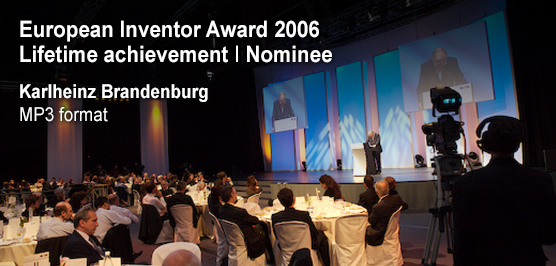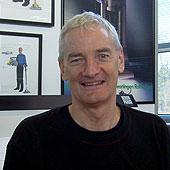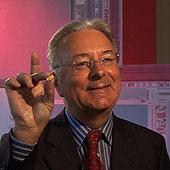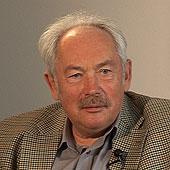Karlheinz Brandenburg
MP3 format
The sound of music
Had it not been for him, Apple would still be a second-rank hardware manufacturer, instead of a market leader. Apple, a market leader? Yes, but not with its computers. Sales of the company's iPod device have long outstripped those of its PCs. But the portable MP3 player would never have come into being without Karlheinz Brandenburg, a postgraduate student at the University of Erlangen in southern Germany. The invention of the MP3 format revolutionised the music world – and transformed the computer as well.
This is how it happened: "It all started with my doctoral supervisor, who had the idea of feeding music down a phone line", Brandenburg explains. "But the patent examiner in Munich told him it couldn't be done. You don't say things like that to a German professor. He immediately went looking for a doctoral student capable of proving that it could be done." The student was Karlheinz Brandenburg. At the end of the 1980s, the man with two degrees, in electrical engineering and mathematics, set out to prove the impossible. That was his first excursion into basic research. He remains an advocate of "productive" science, which not only creates knowledge but also demonstrates its commercial potential.
The media have hailed Brandenburg as an example of what R&D can achieve. Brushing the hype aside, he makes a point of mentioning the others besides himself who were involved in the invention, and those who financed his research: "A success like this is also a matter of luck, of being in the right place at the right time – and finding the necessary resources."
He found them first in Erlangen, where he studied and worked for some 25 years, as a research assistant and later as professor of electronic engineering, before taking up a chair at the Technical University of Ilmenau in Thuringia, where a whole network of research facilities and universities has been set up to foster innovation. He is now director of the Fraunhofer Institute for Digital Media Technology in Ilmenau, and the holder of 25 patents, with several more pending.
Karlheinz Brandenburg was not the only researcher working on digital audio coding. A number of other universities and research bodies, and several commercial companies, had sensed the tremendous potential of the technology. As Brandenburg recalls: "The element of competition really got things moving. Then there was an international body which wanted to standardise the various formats. Suddenly engineers found themselves having to learn about politics in order to survive."
However, the real breakthrough for the invention happened elsewhere: on the internet, in an impressive demonstration of consumer democracy. The researcher made the technology available on the net and triggered an avalanche. Students began using it to swap music CDs, and MP3 took the world by storm. Within months, the format was generating revenues that other product developers could only dream of. World sales of MP3 players topped 50m in 2005, and over 200m internet users have installed a software player on their computer. The biggest internet music store sold 1bn songs in MP3 format, and the licence fees alone from Brandenburg's patent amounted to EUR 16m. MP3 is now the international standard for audio coding. It compresses music files to less than a tenth of their original size, making them quicker to load and economising on disk space.
The inventor has always taken the view that small is beautiful. When the major manufacturers rejected his idea as too complicated, he found a tiny semiconductor company in the quiet university town of Freiburg to build the decoder chip for the MP3 player. He is particularly pleased at the fact that MP3 provided so many small companies with their big breakthrough. His latest project is a stereo system with an online connection for downloading music to match the user's preference.
Instead of sitting in an ivory tower, the researcher Karlheinz Brandenburg always has an eye on the market. As a student, writing his diploma thesis, he already sensed: "It will either sit on a library shelf gathering dust or generate a market worth millions."
Contact
European Inventor Award and Young Inventors Prize queries:
european-inventor@epo.org Subscribe to the European Inventor Award newsletterMedia-related queries:
Contact our Press team#InventorAward #YoungInventors




